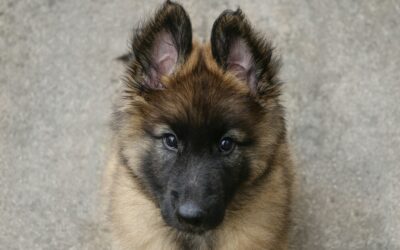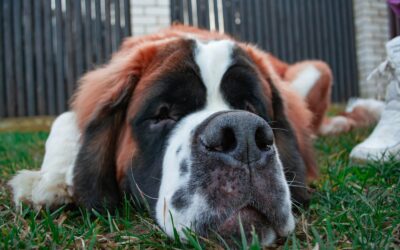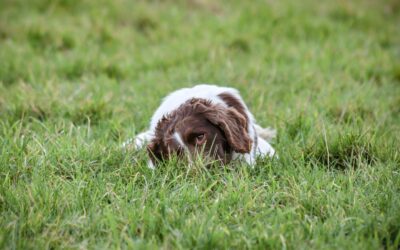Ever caught yourself wondering ‘why does my dog lick me so much’?
You’re not alone. This quirky behavior is a common question among dog owners and pet lovers alike. Whether your dog is licking your hand, face, or any other area, it’s natural to ponder what’s behind this persistent habit. This post will explore the potential reasons behind your dog’s licking behavior, offer insights into whether it’s a cause for concern and provide tips on how to manage it if needed.
Understanding Why Dogs Lick
Dogs love licking humans for various reasons, ranging from affection to more instinctual motivations. Some dogs lick those they love as a sign of attachment and devotion. Similar to how young pups interact with their mothers, many dogs see licking as a comforting behavior, a way to connect with their favorite humans. Additionally, dogs use their mouths to explore the world—much like infants—which means licking is their way of smelling and tasting their surroundings, including you.
While dogs licking provides a form of communication and demonstrates affection, it’s essential to recognize when dog licking might indicate something more. The presence of excessive licking may suggest other issues that dog owners should be aware of, making it vital to read the signs accurately. Understanding these various reasons can form the foundation of interpreting not just licking behaviors but other aspects of your dog’s conduct as well.

Is It a Taste Bud Thing?
One reason your dog might be licking you so much is related to the food we eat. Interestingly, dogs’ saliva often detects what they perceive as a tasty residue on their dog owners’ skin. Whether you’ve been cooking, eating, or even sweating, our bodies frequently emit smells and tastes that dogs find enticing. After all, dogs have an extraordinary sense of smell and taste which makes them keen to taste us if they reckon there’s something delicious in it for them.
This licking behavior might also be linked to the fact that dogs sometimes lick around the mouth or face because it’s an instinctual way of greeting. Within their pack, dogs naturally greet one another by licking the mouth to convey submission, peace, and friendliness. Knowing this, it’s easier to comprehend why dogs might exhibit similar behavior towards humans.
However, as delightful as it might be to think our furry friends find us delicious, constantly licking due to taste could signal a need to watch for clues—perhaps you’ve inadvertently spilled some food on yourself without noticing.

The Affectionate Side of Dog Licking
When your dog licks you, it often indicates strong affection. Dog owners find it sweet, while for the dog, it’s reminiscent of mother-dog affection back in puppyhood days. It’s deeply ingrained in the dog’s nature to lick as an innate demonstration of love. Puppies receive this care early on, and many dogs carry it through life.
Licking is also a method dogs use to show submission and respect. It’s a nonverbal way of expressing appreciation for you being their person. Such manifests as dogs licking humans in moments of calm and perceived contentment. It’s the dog’s way of releasing endorphins that make them happy and relaxed, further enhancing their bond with the owner.
Understanding these affection-driven motives emphasizes how crucial behavior is in building and maintaining the bond between pets and humans. By acknowledging these displays, dog owners can use positive reinforcement to further solidify the connection.
Licking as a Sign of Attention-Seeking Behavior
Some dogs lick excessively as a behavioral quirk to gain attention. Recognizing whether it’s an affectionate or attention-seeking action involves observing when and how your dog licks you. Does this occur when you’re preoccupied at work, spending time on the couch, or engaged with another task? If so, it may be a nudge from your pup indicating they need something from you.
This behavior, a learned tactic from young, is often reinforced when humans instinctively respond back—be it verbally or through cuddles and pats. For dogs who thrive on interaction, licking becomes their reliable attention-seeking tool. Knowing this can become crucial in how you choose to manage and react to such situations.
While never neglecting affection is vital, setting boundaries is equally as important for your pup’s development. Implementing structure and understanding of attention-seeking action paves the way for effective behavior modification techniques.
Grooming and Its Canine Benefits
Dogs also lick as a part of their grooming routine. Similar to grooming cats, dogs will lick themselves to stay clean, especially after eating. Grooming sessions are often soothing, where dogs use licking as a calming ritual, creating a sense of familiarity and rhythm. Importantly, animal behaviorists highlight how mutual grooming, which includes licking humans, is vital in social bonding and acceptance within packs.
It’s also common for dogs to attempt to groom their owners. Many dogs, big and young, will groom a human’s face, hands, or other areas as if they’re a fellow pup in need of cleaning. Puppies and adult dogs alike retain this familial habit of grooming their special people, solidifying trust.
Nonetheless, pay attention to when dogs licking seems excessive, as it may indicate anxiety or stress disorder causes. If excessive behaviors arise, the underlying conditions should be evaluated to ensure a smooth balance between natural grooming and adaptive behavior.

Watch for Excessive Licking
Catch sight of when dog licking pivots from typical to excessive behavior. This shift may be indicative of issues that require intervention. Habitual licking, especially if combined with other symptoms, might be a sign of gastrointestinal problems or anxiety.]
Some dogs experience obsessive-compulsive disorder, leading to forms of compulsive licking, needing to be closely observed. An over-active natural impulse might indicate underlying stress levels or anxiety. Monitoring your dog’s health for unusual signs often necessitates a visit to the veterinarian to determine any medical concerns including allergies or skin disorders causing discomfort.
Excessive licking sometimes extends towards the dog’s coat, paws, or specific isolated spots repeatedly, showing a heightened licking behavior. Understanding when it’s time to seek intervention gets a dog the timely attention needed to preserve their health while avoiding unnecessary distress.
Could It Be Anxiety?
Excessive licking may arise from an anxious or stressed dog, using the action as self-soothing tinnitus. Dogs often resort to licking when dealing with changes in the home or feeling particularly anxious from new environments or sounds. Observing the context in which dogs lick can reveal significant insights into the dog’s body language, illuminating potential triggers.
A key to note is that anxiety may manifest in several behaviors, with licking being one. Notice if your pup’s licking increases during these specific situations, drawing the line between regular engagement and support when necessary. Even more, unwanted licking can affect the dog’s skin, leading to abrasions, sores, or developing infections. This unhealthy pattern should be interrupted and handled with dog behavior modification strategies.
Implementing training, focusing on de-escalation strategies, and constant reassurance aid anxiety-affected dogs greatly. Many pet owners find rewarding brave steps, shifts in focus, and positive reinforcement immensely helpful.
The Role of Dogs’ Health in Licking Behavior
Dogs licking behavior might stem from their health-related impulses. Issues like gastrointestinal problems, allergies, or infections often drive a dog to lick certain spots to heal discomfort, utilizing your dog’s saliva. This makes it crucial for dog owners to remain vigilant towards their pup’s health and comfort.
Just as humans experience various health signals, our furry companions do too, with licking defining one mode of communication. Any shifts from routine to incessant licking should flag attention. If your dog appears sick or troubled and continues rapid licking, scheduling a veterinarian consult is wise.
Keeping an eye on the overall picture of your dog’s behavior will ensure healthy transitions through life stages. Pup care with holistic vet support throughout young and old alike will foster relationships of health and happiness down the line.
Training Techniques for Licking Behavior
If your dog tends to lick excessively, consider employing training techniques to redirect this behavior gently. Positive reinforcement during training encourages productive and interactive sessions. Command words like “sit” or “lay down,” followed by rewards—like a tasty treat or praise—guide them away from excessive licking.
It’s important to address the proper balance between encouragement and restraint. Using toys, engaging games, and play sessions easily focus a dog’s energy elsewhere, minimizing room for obsessive licking. These tactics vary, yet tailoring them to specific canine personalities and habits frequently yields favorable outcomes.
Furthermore, addressing foundational training, focusing on structured and step-oriented commands, ensures understanding and enhances your bond. Extend gentle teaching moments without imposing harsh corrections. At the same time, always apply consistent cues, making room for follow-through exercises and consistent outcomes.

Exploring the Importance of Veterinarians
Veterinarians play a crucial role when digging deeper into why a dog licks constantly. Whether it’s your dog’s health, behavior, or a mix, a vet provides essential guidance in revealing root causes, ensuring optimal outcomes of your dog’s lifestyle.
During visits, keeping an open discussion proves valuable. Sharing observations of recent behavioral shifts, focus on behaviors, or areas of concern permits informed assessments on your pup’s wellness. Active participation allows pet parents to harness resources efficiently, achieving thriving pet relationships together.
Preventive appointments keep the future brighter, a paw at a time—helping identify symptoms and intervene early. A vet’s attention covers diet, nutrition, exercise balance, licking, and more, maximizing health while forging fruitful paths ahead.
Top Toys and Treats to Help with Excessive Licking
Here is a list of some of the best toys and treats available, designed to engage your dog and help manage excessive licking behavior. Each of these products encourages mental stimulation and healthy chewing habits.
KONG Classic Dog Toy
The KONG Classic is great for mental and physical stimulation. It’s durable, bounces unpredictably, and can be filled with treats to keep your dog occupied.
Greenies Original Dental Treats
These dental treats not only help clean your dog’s teeth and freshen breath, but they also keep your dog busy and satisfied.
Nylabone Power Chew Textured Dog Chew
Designed for aggressive chewers, this chew toy can keep your dog entertained for hours while promoting good dental health.
Bully Sticks by Natural Farm
Bully sticks are long-lasting, all-natural treats that provide hours of chewing enjoyment for your dog.
Benebone Wishbone Dog Chew Toy
With its unique shape and flavor options, this chew toy is perfect for engaging your dog’s instincts and can reduce stress-related licking.
Lickimat Classic Buddy
The Lickimat is a fantastic tool for slowing down eating and enriching dogs‘ mealtime. Spread your dog’s favorite soft treat on the mat, and let them lick away.
Each of these products can be utilized as part of a comprehensive strategy to address excessive licking and promote a balanced, healthy lifestyle for your dog.
Ingenious Ways To Encourage Good Behavior
Ensuring optimal outlets for energy and attention fosters great behavior in dogs while deterring habits like excessive licking. Simple methods of encouragement can boost engagement with good practices.
Spending quality time keeping pets mentally and physically engaged across interactive games, delight in life outdoors. Exploring hikes, dog-friendly spaces, and playful environments promote not just exercise but mental acuity. Such activities stimulate canine senses while curbing frustration tendencies.
Additionally, offering diverse toys and puzzles engages inquisitive pup spirits. These methods keep dogs entertained while gradually developing independence and focus away from undesired actions. Training with bite-sized agendas creates golden opportunities for growing adaptability and awareness skills.
Watching Your Dog’s Body Language
Understanding your dog’s body language is imperative for any pet owner. Observing hints like relaxed paws, happy ears, and wagging tails helps deduce their mood. Recognizing when the pup is anxious, sick, or stressed with tense stances, frozen tail, or wide eyes is crucial.
Empowering pet owners on how dogs communicate through presence strengthens relationships. When licking-related signs surface, analyzing your pet’s emotions becomes pivotal in addressing their needs continuously.
With this insight, the pet owner’s agility in interacting transforms effortlessly. Addressing concerns with empathy and identifying satisfaction consistently nurtures lifebonds.

Navigating Licking in Young Puppies
Puppies love to lick as they learn about life and grow into their surroundings. Proper guidance early prevents unwanted behavior down the road. Young puppies naturally explore landscapes and boundaries joyfully.
Enshrining care with boundaries improves development while making everything a learning environment through mature guidance. Puppies are naturally observant, so rewarding great conduct with small treats delights their budding spirits.
Structured companionship, balanced discipline, and comforting nurture help puppies adapt securely. Catching issues early resonates profoundly in fostering obedient and vibrant lives.

Stop by Snouts and Stouts Indoor Dog Park and Bar to help your dog let some of that pent-up energy out!
Leading Onward Towards Happy Relationships | Why Does My Dog Lick Me So Much?
While licking behavior can invoke significant curiosity, it often derives from affection unless extraordinarily excessive. Cooperation and balance between owner, training, behaviorist exploration, and vet partnerships ensure well-rounded and engaging environments.
Forming positive habits, nurturing bonds through communication, and knowing partners diligently forms unshakable strength. The essence of handling dog behaviors lies in patience, diligent observation, and promoting balanced lifestyles enthusiastically.
Discovering new pathways towards the pup-angle brings new stories around joy, unity, and companionship within communities striving for shared happiness.



